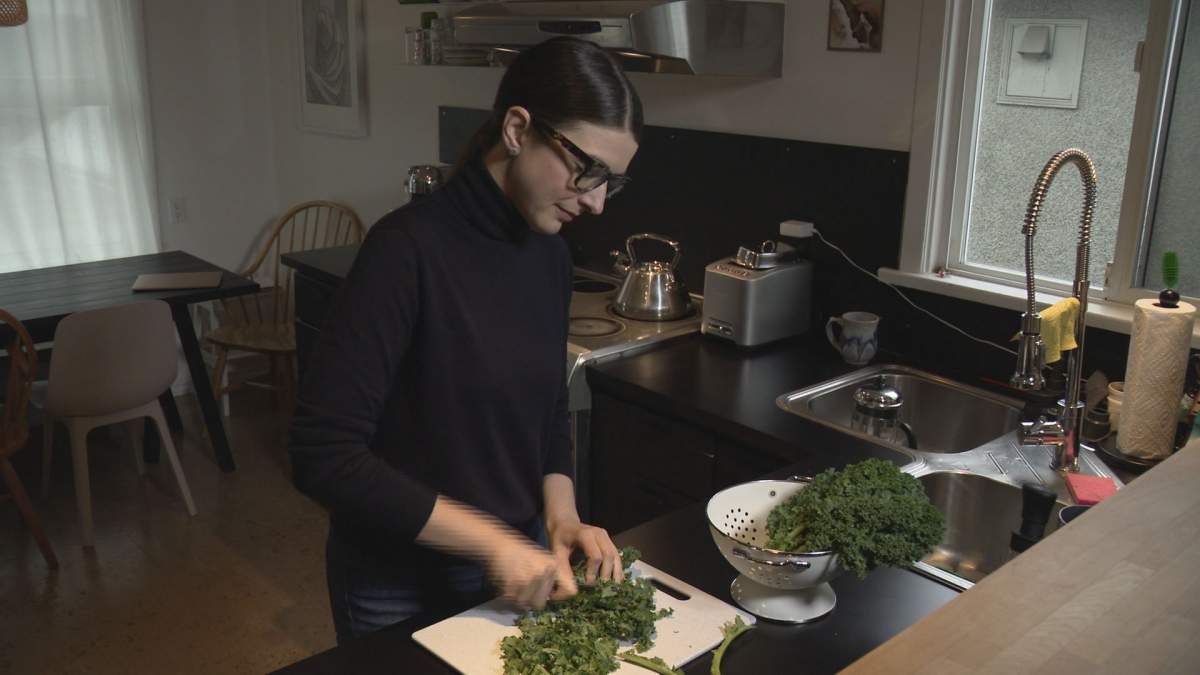Caine is a typical three-year-old. His favourite sandwich is an ice cream sandwich.

“He loves his pasta, he loves his pizza, but I made sure from a young age to get him interested in spices and different cuisines. So, he does enjoy things like curries or stir fry,” his mom Courtney Bussey-Taverner said.
While colourful and adventurous, Caine’s plate does not include meat. His mom is raising him on a plant-based diet.
“It was just kind of a no-brainer. Why wouldn’t I do it for my son if it was such a good choice for me?”
Bussey-Taverner said it was hard to find a family doctor in Edmonton who would take her toddler as a patient. She did a lot of research and met with a dietitian first to ensure she knew how she would respond to concerns about nutrition.
“Stuff like calcium or iron. Those are really hard to find, or B12 as well,” Bussey-Taverner said.
Desiree Nielsen is a registered dietitian and mother of two. She’s also the author of the book new book, Eat More Plants. She says the biggest myth about raising plant-based kids is that they will be nutrient deficient.

Get weekly health news
“Protein requirements — especially for toddlers — are a lot less than most parents would expect. Most toddlers it’s between 10 and 20 grams for an entire day — which, with a little piece of sprouted grain bread, some nut butter, some tofu, a little bit of whole grain is actually incredibly easy to reach those targets,” Nielsen said.
Nielsen said families eating a range of whole foods like legumes, fruit, vegetables, whole grains, nuts and seeds will get the nutrients they need.
“When you look to the single-ingredient plant foods — like almonds, like broccoli, brown rice, millet — and make at least 80 per cent of your plate those kinds of foods, then what you will see is a lot more fibre intake, which helps to regulate digestion and support a healthier microbiome,” Nielsen explained.
She believes these foods keep blood sugars more balanced.
“They are also nutrient-dense, meaning they have a lot of nutrition. Things like vitamins, minerals, phytochemicals, as opposed to calorie-dense, which a lot of hyper-processed food in our system is,” Nielsen said.
Nielsen recommends parents boost healthy fats for toddlers and young children. That means choosing organic soy milk over nut milk because it has higher fat and protein. There’s also one thing all family members will need outside the plant kingdom — B12.
“If you are 80 per cent plant-based everyone should be taking B12 because that’s typically found in animal foods.”
The number of vegans, vegetarians and “flexitarians” — people consciously eating less meat — is on the rise in Canada, now totalling around 6.5 million people, a group roughly the same size as the population of the Greater Toronto Area.
On its website, the Canadian Paediatric Society says “well-planned vegetarian and vegan diets with appropriate attention to specific nutrient components can provide a healthy alternative lifestyle at all stages of fetal, infant, child and adolescent growth. Appropriate education of the family and follow-up over time are essential. ”
Bussey-Taverner said she’s confident her son is eating a balanced diet and is hopeful it will be a life-long choice.
“I am not naive. He’s probably going to be curious as he gets older and he’ll probably want to try things when he is away from home, and I can’t control that. We are always going to be plant-based at home and guide him to make the right decisions and understand why we do what we do,” Bussey-Taverner said.

- They ‘ran into gunfire’: Impact of the Tumbler Ridge shooting on first responders
- Tumbler Ridge shooting fuels misinformation about trans people, organization says
- Soaring number of fatal crashes in Calgary already on pace to top last year
- Calgary police charge nail salon employee with sexual assault










Comments
Want to discuss? Please read our Commenting Policy first.